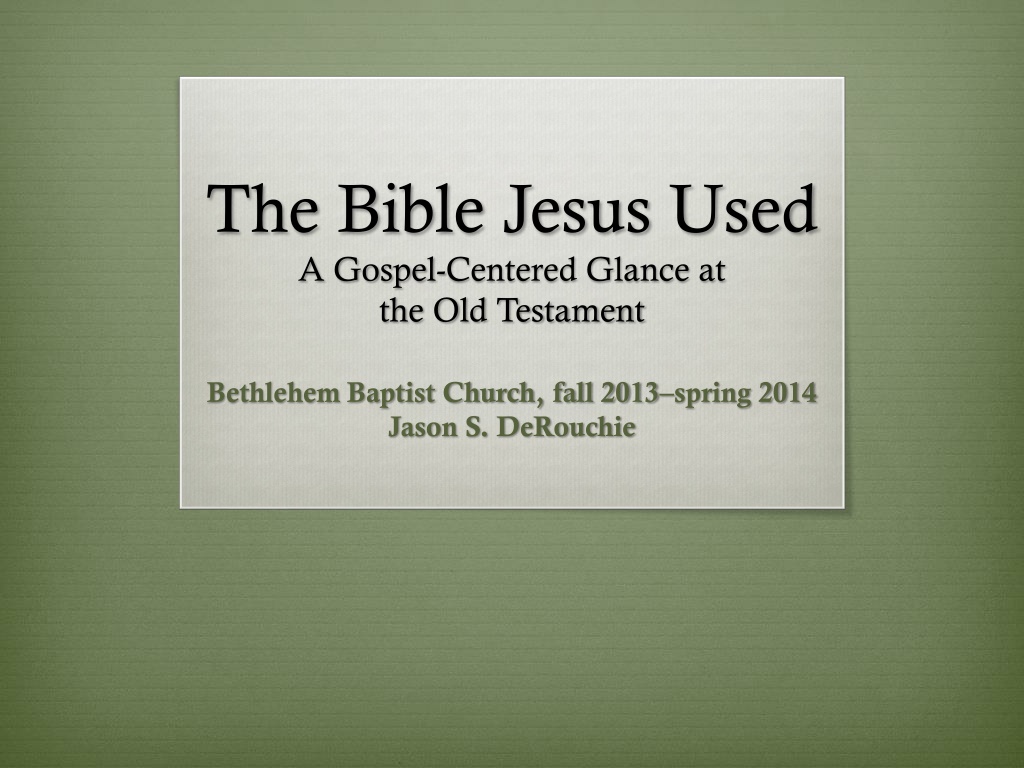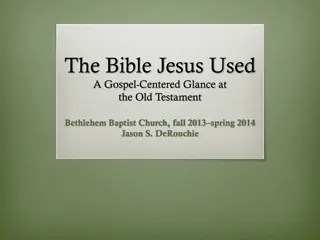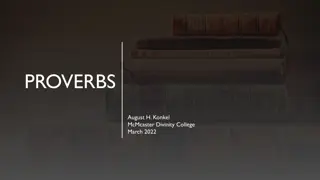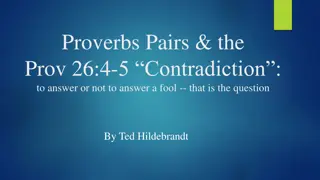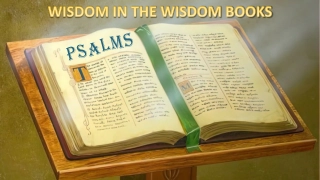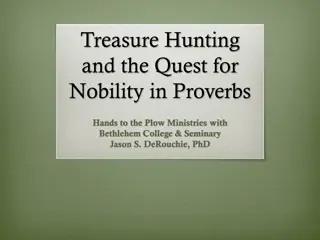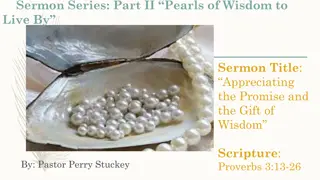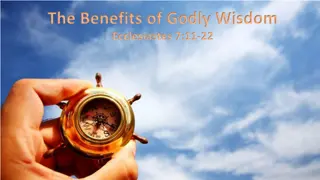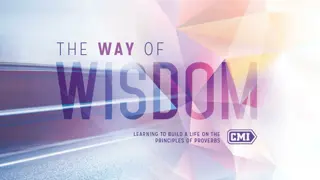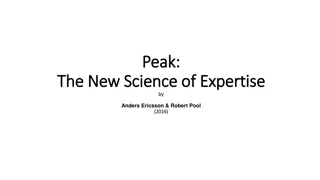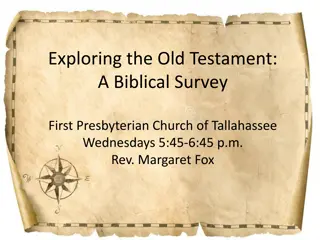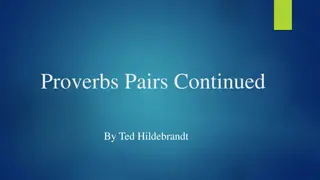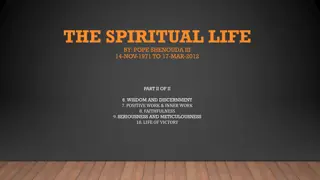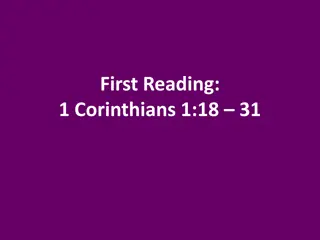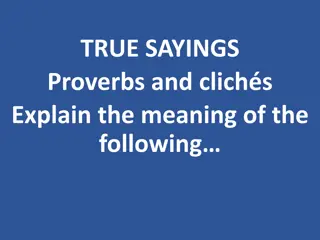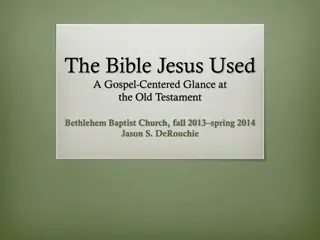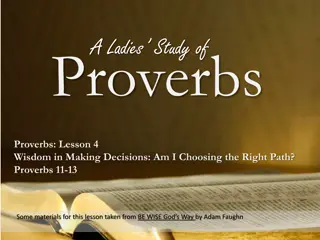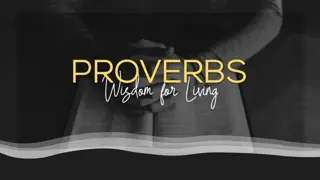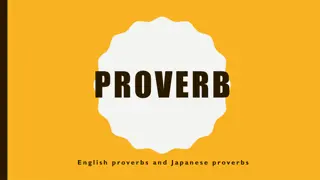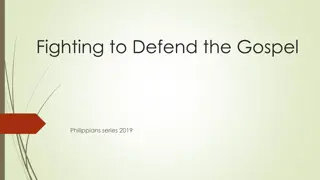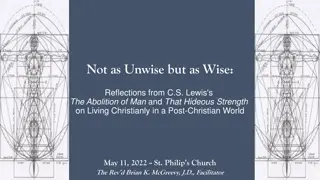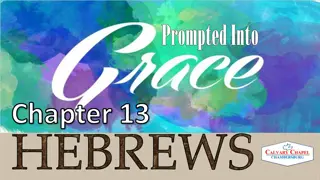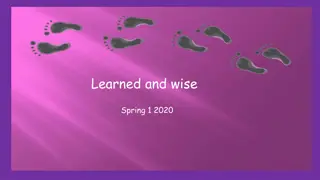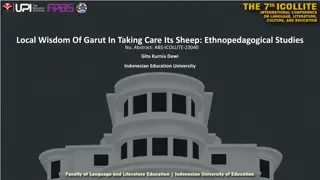Wisdom and Proverbs: Insights into Living a Purposeful Life
Delve into the profound wisdom and memorable insights of the Old Testament's Proverbs, exploring themes of knowledge, practice, discretion, and the personification of wisdom and folly. Discover the timeless advice encapsulated in pithy sayings that guide readers towards upright living and thoughtful decision-making.
Download Presentation

Please find below an Image/Link to download the presentation.
The content on the website is provided AS IS for your information and personal use only. It may not be sold, licensed, or shared on other websites without obtaining consent from the author. Download presentation by click this link. If you encounter any issues during the download, it is possible that the publisher has removed the file from their server.
E N D
Presentation Transcript
The Bible Jesus Used A Gospel-Centered Glance at the Old Testament Bethlehem Baptist Church, fall 2013 spring 2014 Jason S. DeRouchie
Proverbs at a Glance Preamble 1:1 7 Prologue: The importance of wisdom 1:8 9:18 Proverbial Collections Proverbs of Solomon I Sayings of the Wise I Sayings of the Wise II Proverbs of Solomon II Sayings of Agur Sayings of Lemuel 10:1 31:9 10:1 22:16 22:17 24:22 24:23 34 25:1 29:27 30:1 33 31:1 9 Epilogue: The ideal wife, a woman of wisdom 31:10 31
Preamble (1:17) The goal: To produce knowledge (v. 2), upright practice (v. 3), and discretion in when to apply both (v. 4). Wisdom in Proverbs: The pursuit of understanding and preserving order in God s world (vv. 5 6). The fear of the LORD: The beginning of the quest, which is not engaged in by fools (v. 7).
Prologue (1:89:18) The personification of wisdom and folly as women. Lady wisdom (1:20 33; 3:13 20; 4:5 9; 7:4 5; 8:1 31; 9:1 12) Dame folly (9:13 18; cf. 2:16 19; 5:3 8; 6:23 24; 7:5)
Why female personification? Abstract nouns are usually feminine in Hebrew (e.g., wisdom, law, understanding, love) The book is written to a youthful male audience, for whom women are to be desirous. Prov 1:4. . . . to give prudence to the youth. (Cf. 7:7; 20:11; 22:6, 15; 23:14; 29:15). Prov 1:8. Hear, my son, your father s instruction. (Cf. e.g., 2:1; 3:1, 11, 21; 4:1, 10, 20; etc.)
Proverbial Collection (10:131:9) The Proverb Test 16 20 = Proverbial genius 11 15 = Proverbially bright 6 10 = Proverbially dull 0 5 = Proverbially challenged
Proverbs as memorable bites Proverbs package timeless generalizations in memorable ways. To remember well, we need: Small bits, capable of being chewed; Rehearseable bits, worded in a way easily restated; Understandable bits in a fluent language.
Most proverbs are pithy, memorable, and poetic. Example 1: Look before you leap vs. In advance of committing yourself to a course of action, consider your circumstances. Example 2: A stitch in time saves nine vs. There are certain corrective measures for minor problems that, when taken early on in a course of action, forestall major problems from arising.
Proverbs as generalizations that are usually true. The briefer the statement, the less likely it is to be totally precise and universally applicable. 1a. Birds of a feather flock together. 1b. Opposites attract.
Proverbs as generalizations that are usually true. The briefer the statement, the less likely it is to be totally precise and universally applicable. 1a. Birds of a feather flock together. 2a. Too many cooks spoil the broth. 1b. Opposites attract. 2b. Two heads are better than one.
Proverbs as generalizations that are usually true. The briefer the statement, the less likely it is to be totally precise and universally applicable. 1a. Birds of a feather flock together. 2a. Too many cooks spoil the broth. 3a. He who hesitates is lost. 1b. Opposites attract. 2b. Two heads are better than one. 3b. Look before you leap.
Proverbs as generalizations that are usually true. The briefer the statement, the less likely it is to be totally precise and universally applicable. 1a. Birds of a feather flock together. 2a. Too many cooks spoil the broth. 3a. He who hesitates is lost. 4a. A bird in the hand is worth two in the bush. 1b. Opposites attract. 2b. Two heads are better than one. 3b. Look before you leap. 4b. A man s reach should exceed his grasp.
Proverbs as generalizations that are usually true. The briefer the statement, the less likely it is to be totally precise and universally applicable. 1a. Birds of a feather flock together. 2a. Too many cooks spoil the broth. 3a. He who hesitates is lost. 4a. A bird in the hand is worth two in the bush. Prov 26:4. Answer not a fool according to his folly, lest you be like him yourself. 1b. Opposites attract. 2b. Two heads are better than one. 3b. Look before you leap. 4b. A man s reach should exceed his grasp. Prov. 26:5. Answer a fool according to his folly, lest he be wise in his own eyes.
Proverbs are not promises, at least for the present age. Example 1: Prov 15:25. The LORD tears down the house of the proud but maintains the widow s boundaries. Life and Scripture testify that there are arrogant people whose houses still stand and widows who have been abused by greedy creditors or fraud. Job 24:2 3. Some move landmarks; they seize flocks and pasture them. 3They drive away the donkey of the fatherless; they take the widow s ox for a pledge. Mark 12:40. [They] devour widow s houses and for a pretense make long prayers. They will receive the greater condemnation.
Proverbs are not promises, at least for the present age. Example 1: Prov 15:25. The LORD tears down the house of the proud but maintains the widow s boundaries. Life and Scripture testify that there are arrogant people whose houses still stand and widows who have been abused by greedy creditors or fraud. The principle: God opposes the proud and cares for the needy, and he will eventually make all things right.
Example 2: Prov 22:2627. Be no one of those who gives pledges, who put up security for debts. 27If you have nothing with which to pay, why should your bed be taken from under you. Should you never buy a house on mortgage (a secure debt)? Will all credit card debt automatically result in God s taking away all your possessions including your bed? The principle: Debts should be taken cautiously because foreclosure can be very painful.
Example 3: Prov 29:2. If a ruler listens to falsehood, all his officials will be wicked. Do this proverb guarantee that a government official has no choice but to become corrupt if his boss (e.g., the president, the governor, etc.) listens to some people who do not tell him the truth? The principle: The ruler who insists on truth will help keep the government honest.
Example 4: Prov 22:6. Train up a child in the way he should go; even when he is old he will not depart from it. Popular interpretations? The problem: Word-for-word: Give training to the child according to his way; even he grows old, he will not depart from it (cf. NASB margin). No Hebrew equivalent for should. The 3ms pronoun his related to way is unexplained.
Why does his way mean? Only two ways in Proverbs: the way of wisdom and life or and the way of folly and death. Prov. 11:5. The righteousness of the blameless keeps his way straight, but the wicked falls by his own wickedness. Prov. 14:2. Whoever walks in uprightness fears the LORD, but he who is devious in his ways despises him. Prov. 16:17. The highway of the upright turns aside from evil; whoever guards his way preserves his life. Is the youth s way more the way of wisdom or folly?
When left to themselves, the young lack judgment and have hearts filled with foolishness. Prov. 7:7. And I have seen among the simple, I have perceived among the youths, a young man lacking sense. Prov. 22:15. Folly is bound up in the heart of a child, but the rod of discipline drives it far from him.
Without discipline, the young bring disgrace on their mothers. Prov 29:15. The rod and reproof give wisdom, but a child left to himself brings shame to his mother.
Parents are thus exhorted to discipline their children and to instruct them in wisdom. Prov. 1:1, 4. The proverbs of Solomon, son of David, king of Israel: . . . to give prudence to the simple, knowledge and discretion to the youth. Prov. 19:18. Discipline your son, for there is hope; do not set your heart on putting him to death. Prov. 29:15. The rod and reproof give wisdom, but a child left to himself brings shame to his mother.
Conclusion: Prov 22:6. Give training to the child according to his way; even he grows old, he will not depart from it. The way of a child seems more negative than positive; it is the way without wisdom. We are always training, and the proverb appears to be an ironic command that warns parents of the result of not establishing standards and boundaries for their children. The principle: Let a boy do what he wants, and he will become a self-willed adult incapable of change!
But proverbs are not promises! And the power of the gospel can transform any child who was not raised well! 2 Cor 5:17. Therefore, if anyone is in Christ, he is a new creation. The old has passed away; behold, the new has come.
The purpose of proverbs: Prov 25:11. A word fitly spoken is like apples of gold in a setting of silver. Prov 26:9. Like a thorn that goes up into the hand of a drunkard is a proverb in the mouth of fools.
